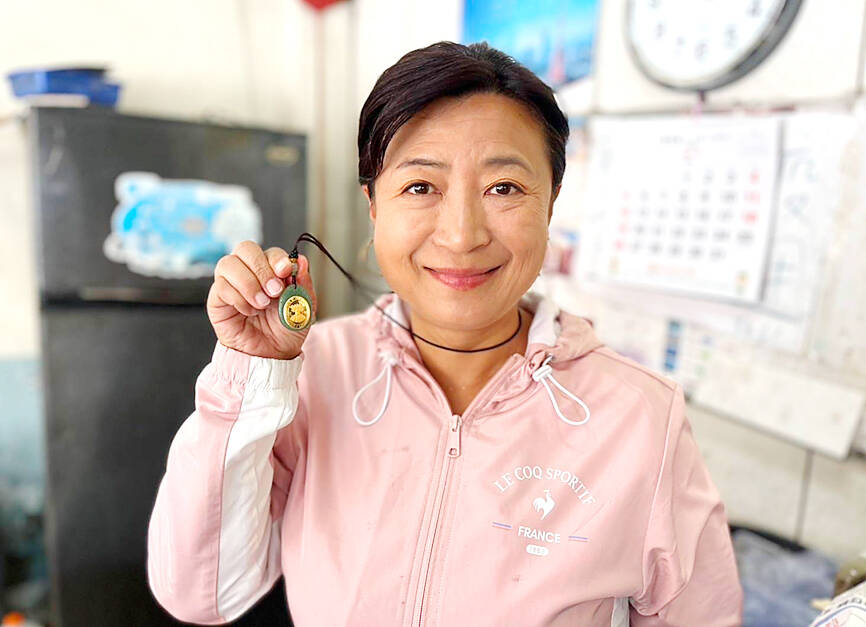The Democratic Progressive Party’s (DPP) Tsai Pei-hui (蔡培慧) yesterday narrowly beat the Chinese Nationalist Party’s (KMT) Lin Ming-chen (林明溱) by 1,925 votes to win a Nantou County legislative by-election.
Tsai won 45,218 votes, or 49.44 percent of the total, while Lin garnered 43,293, or 47.34 percent, election officials said.
During the afternoon, as local polling stations started reporting ballot counts, Lin was trailing by about 2,000 votes.

Photo courtesy of Tsai Pei-hui’s campaign office via CNA
“This is a demonstration of Taiwan’s democratic spirit,” Tsai said in Nantou City after Lin conceded at about 5:30pm.
She promised to start her work as legislator tomorrow, adding that in addition to the policies she proposed in the campaign, she would also seek to implement some policies proposed by Lin.
“One by one, I will work hard to implement these programs, including improving social welfare for the elderly, while pushing for funding for more large hospitals, attracting more industry and building science parks for our county,” she said.
Vice President William Lai (賴清德), who is chairman of the DPP, said Tsai’s victory has given the party a much needed boost, after three consecutive defeats since last year’s nine-in-one local elections.
“This is a crucial turning point for the DPP to start a winning streak against the KMT,” he said of the party’s first electoral victory since he became chairman.
“It will end the string of defeats so our party can consolidate support with the aim of winning the upcoming elections,” he said in a statement.
KMT county commissioners and legislators have dominated Nantou politics for most of the past 20 years. The last DPP member to win in the county was Lin Tsung-nan (林宗男), who was county commissioner from 2001 to 2005, preceded by DPP commissioner Peng Pai-hsien (彭百顯), who served from 1997 to 2001.
President Tsai Ing-wen (蔡英文) also congratulated Tsai Pei-hui, who was a legislator-at-large from 2016 to 2020.
“Tsai Pei-hui will return to the legislature, and she will strive diligently to work for Nantou County, and bring the values of our party to provide better care and look after the people,” Tsai Ing-wen said in a statement.
“Winning this election is only the start of the hard work ahead... When people rally together, we can overcome difficulties and tough challenges, and strive forward to progress on the road ahead,” she said.
Lin called the election unfair, saying that Tsai Pei-hui had more resources than he did, adding that he had been “running out of weapons and ammunition” toward the end.
“So we lost by just more than 1,000 votes — a very small margin. We did not put in enough effort in this race, although we had the chance to win... Also I was tarnished by media reports, and was tainted by a smear campaign, that is why in the end I lost narrowly,” Lin said.
Also on the ballot were independent candidate Chen Tsung-chien (陳聰鑑), former mayor of Mingjian Township, and Lu Yu-chun (魯昱君), a retired school counselor and former military political affairs officer. They received 2,528 and 421 votes respectively.
The turnout was 46.35 percent of the 198,412 total eligible voters, considered high for the district, the Central Election Commission said.

The Ministry of Foreign Affairs (MOFA) yesterday said it is closely monitoring developments in Venezuela, and would continue to cooperate with democratic allies and work together for regional and global security, stability, and prosperity. The remarks came after the US on Saturday launched a series of airstrikes in Venezuela and kidnapped Venezuelan President Nicolas Maduro, who was later flown to New York along with his wife. The pair face US charges related to drug trafficking and alleged cooperation with gangs designated as terrorist organizations. Maduro has denied the allegations. The ministry said that it is closely monitoring the political and economic situation

UNRELENTING: China attempted cyberattacks on Taiwan’s critical infrastructure 2.63 million times per day last year, up from 1.23 million in 2023, the NSB said China’s cyberarmy has long engaged in cyberattacks against Taiwan’s critical infrastructure, employing diverse and evolving tactics, the National Security Bureau (NSB) said yesterday, adding that cyberattacks on critical energy infrastructure last year increased 10-fold compared with the previous year. The NSB yesterday released a report titled Analysis on China’s Cyber Threats to Taiwan’s Critical Infrastructure in 2025, outlining the number of cyberattacks, major tactics and hacker groups. Taiwan’s national intelligence community identified a large number of cybersecurity incidents last year, the bureau said in a statement. China’s cyberarmy last year launched an average of 2.63 million intrusion attempts per day targeting Taiwan’s critical

‘SLICING METHOD’: In the event of a blockade, the China Coast Guard would intercept Taiwanese ships while its navy would seek to deter foreign intervention China’s military drills around Taiwan this week signaled potential strategies to cut the nation off from energy supplies and foreign military assistance, a US think tank report said. The Chinese People’s Liberation Army (PLA) conducted what it called “Justice Mission 2025” exercises from Monday to Tuesday in five maritime zones and airspace around Taiwan, calling them a warning to “Taiwanese independence” forces. In a report released on Wednesday, the Institute for the Study of War said the exercises effectively simulated blocking shipping routes to major port cities, including Kaohsiung, Keelung and Hualien. Taiwan would be highly vulnerable under such a blockade, because it

Conflict with Taiwan could leave China with “massive economic disruption, catastrophic military losses, significant social unrest, and devastating sanctions,” a US think tank said in a report released on Monday. The German Marshall Fund released a report titled If China Attacks Taiwan: The Consequences for China of “Minor Conflict” and “Major War” Scenarios. The report details the “massive” economic, military, social and international costs to China in the event of a minor conflict or major war with Taiwan, estimating that the Chinese People’s Liberation Army (PLA) could sustain losses of more than half of its active-duty ground forces, including 100,000 troops. Understanding Chinese